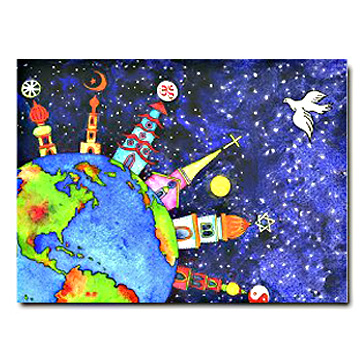Tyranny of Joy

by Rebecca Crichton
The holiday time we are about to enter has many enduring values for everybody. Ideally it is a time for generosity and connection, a time when we feel grateful for what we have and share that with others. It can also be a time for reflection and the discovery of what is really meaningful to us and those close to us.
I want to share a number of questions that come up for me around this time every year, which I usually either stuff away or share with only a few trusted friends. They are all around the same issue and they are all about a struggle that I think is worth discussing.
To start with, I wonder why so many people, in this most diverse society in the world, are resistant to recognizing and valuing the diversity around us? Why do we become unwilling, angry, or blind to requests to expand our consciousness around the year-end seasonal celebrations to include more than the celebration of Christmas? Why, in the stores I visit, with their wide diversity of employees and customers, are there still mainly Christmas decorations, Christmas trees, and Christmas greetings?
That said, the deeper questions I have, and they are ones I ask myself as well as others, are about how we celebrate the holiday season in a diverse and open-hearted way. Why do we get defensive when people tell us that they are not feeling festive or that they don’t celebrate this season’s holidays and want us to reset the way we greet them or the way we include them in conversations?
I am Jewish and I celebrate Chanukah. I have friends who are Buddhist, Ba’hai, and Sufi, and I know that we all have different rituals and approaches to this time of year in which the pervasive message of celebration and joyousness permeates every medium but is often limited to images to Christmas that mainly date from Victorian times. (Early Puritan Americans did not observe Christmas as a day of celebration or gift-giving.)
Another batch of questions I ask has to do with why are we so determined to force joy on each other? I facilitate grief support groups for people who have suffered a variety of losses. Some mourn the death of people close to them. Some grieve relationships that ended painfully. Some are dealing with losses related to their jobs, their incomes, or their way of life.
In the grief field, starting in November, we begin to gear up for the difficult season ahead. We share articles like, “Getting through the holidays” or “Coping with holiday expectations, yours and others.” We discuss how people who feel less than joyous can handle not only the expectations of the general society, but what often feels like an abrupt shift of attitude in people close to them. They start to hear things like, “Come on, you can’t be unhappy for the holidays. You’ve got to get over this.” Suffering people know what those words really mean: “Don’t make me feel sad when I want to be happy. Don’t make me have to think about your loss when I want to bake cookies, string lights, and sing carols. Don’t be a drag.”
Crisis clinics prepare for the holiday season with increased staff trained specially to respond to the calls of people who are sick, alone, sad, and unable to cope with the endless litany of hearty good will.
I truly believe that much of what I am writing about — the automatic “Merry Christmas” greetings and the relentless celebratory attitude — is absolutely without harmful intention. People’s attitudes range from unconscious to uninformed and represent nothing more than their being accustomed to doing things their own way. They don’t stop to think about expanding those habits of behavior and thought to include others who do things differently.
And I also believe that ignorance and habit shouldn’t be excuses for causing pain or misunderstanding. It is more than a question of valuing or respecting diversity, although that is a core issue to this discussion. Diversity in the terms I am using it is not just the variety of approaches to what we celebrate or don’t celebrate during the holiday season.
It is about whether we can stretch ourselves to recognize that much of what we do — the way we think that how we celebrate is the “right” way — is about choice and habit. When other people make different choices, how do we see them as simply that, not as a deliberate challenge to our own choices? Can we be open to hearing that someone is having a different experience from ours and not have to convince them their way is wrong and ours is better, or right?
There are a number of inspirational stories and poems circulating on the Internet about how the best “presents” are those of “presence.” I know somebody who gives handcrafted IOU ‘presence’ to people to be redeemed throughout the coming year. I remember being struck by the statement that “the best gift you can give someone is rapt attention.” I try to remember that when I am hurrying a conversation along and think I have more important things to do than really listen.
Changing behavior, as we all know, is uncomfortable. When others ask us to change behaviors that have become automatic, we can become defensive and decide the other person is the one with the problem, not that we have contributed to it in any way.
Once, at the beginning of one of the grief groups I mentioned earlier, I stood at the door as the official greeter. “Hi. How are you?” I said to somebody, using the automatic greeting. The person stopped, looked at me, and said, “How do you think I am? I’m here to cry for two hours because my mother died, and you’re asking me how I’m doing.” I apologized and felt both confused and defensive. But I thought about it later. Was there something else I could say when I welcomed grieving people to the group? Had other people felt that way but never said anything about it?
The next time I was the greeter, I said, “Good to see you again.” “Glad you could come.” “Welcome.” I felt awkward and waited for people to give me odd looks, but nobody did. People even stopped and answered that they were glad to be there. It was important for them to be there. We had a real interchange, one that took only a moment longer than the previous ritualized exchange.
As a starter on this path of expanded consciousness, how about some new greetings that state a deeper level of seasonal meaning: “Peace be with you!” “Let there be light!” And, because food is still a central part of my own holiday observances, I wish you all the presence of good food, valued friends, and much light. Season’s greetings!
Rebecca Crichton started her ‘Encore Career’ as Executive Director of NWCCA in 2013 after 21 years with The Boeing Company. She refashioned her skills and knowledge as a writer, curriculum designer and leadership development coach to offer programs related to Creative Aging at many venues in the Seattle area.
